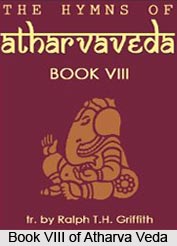 There are ten hymns in Book VIII of Atharva Veda. The first hymn is a charm to recover a man who is dying. The second hymn is also the same. The following hymn is a prayer for the destruction of demons. Malediction on demons forms the fourth hymn. Thereafter is a charm that accompanies inauguration with an amulet. The sixth hymn is also a charm to exercise evil spirits who inundate women. The seventh Hymn is a magic to restore a sick man to good health. The eighth hymn is imprecation that is directed against an aggressive army. An accent of Cosmogonical, ritual, and metrical doctrine forms the ninth hymn. The final hymn is a glorification of the mystical abstraction.
There are ten hymns in Book VIII of Atharva Veda. The first hymn is a charm to recover a man who is dying. The second hymn is also the same. The following hymn is a prayer for the destruction of demons. Malediction on demons forms the fourth hymn. Thereafter is a charm that accompanies inauguration with an amulet. The sixth hymn is also a charm to exercise evil spirits who inundate women. The seventh Hymn is a magic to restore a sick man to good health. The eighth hymn is imprecation that is directed against an aggressive army. An accent of Cosmogonical, ritual, and metrical doctrine forms the ninth hymn. The final hymn is a glorification of the mystical abstraction.
This article is a stub. You can enrich by adding more information to it. Send your Write Up to content@indianetzone.com













